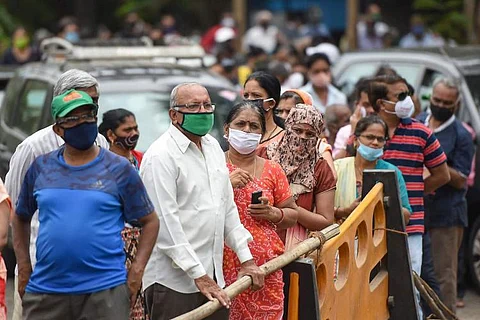

Over the past few weeks, there have been reports about a sudden spurt in cases similar to influenza. The symptoms include cough, cold, fever, fatigue, and a persistence of these conditions beyond two weeks. Coming three years after COVID-19, this wave of infections has caused speculations about whether this is a new infection. However, this type of spurt is not new but is reported every year, doctors tell TNM.
Speaking to TNM, Infectious Diseases Specialist at Apollo Hospitals Dr Senthur Nambi says that this is neither new nor something to be worried about. “Influenza is reported in India each year, but what is different this year is the recurrent episodes of viral infection in a healthy adult that is reported now. There are multiple factors contributing to this. While a majority of them do not get sick enough to be admitted in a hospital, their productivity is affected for a prolonged period of time,” he explains.
“Over the last couple of months, we are seeing patients coming in with fever, throat irritation, body pain, and exhaustion, and most of them get better by day 3 or 5. A few of these patients continue to have persistent irritation and dry cough lasting for 1-2 weeks, and sometimes longer too. Flu generally subsides in 2 to 3 days. However, this is not life threatening nor does it need admission except in a few cases,” Dr Basavaraj Kuntoji, Consultant – Internal Medicine at Manipal Hospital in Bengaluru, says.
Stating that the viruses causing infections have come back to the fore after three years of COVID-19, Dr Senthur says that it is not one particular virus but multiple viruses that cause flu and respiratory infections. According to the doctors, there are multiple reasons behind such recurrent infections:
> there is no restriction of movement currently and no one wears masks, which makes the transmission of any virus easier
> after nearly three years of the pandemic and associated restrictions, people are free to go anywhere and so they are planning a lot of activities – travel, picnics, holidays, get-togethers, etc. – again helping the virus spread widely
> before COVID-19, at least some people took the flu vaccine, but after COVID-19 that has reduced
> unusually prolonged cold weather this year and smog reported in some cities
> some patients pick up secondary bacterial infections and may need oral antibiotics
Dr Senthur adds that the pattern observed is that the infections are self-limiting and patients get better by day 4 or day 5. “In some people, it goes into persistence and they develop complications and require hospital care, but this is a very small number. However, this virus damages the respiratory mucosa (membrane lining the respiratory tract), which is the reason for the persistent irritation or cough symptoms,” he explains, adding that there are three patterns seen from the kind of cases reported now:
> in school-going and college-going persons, symptoms are fever, cough, and cold, and they get better by day 3 or 4
> in young individuals, fever, cough, cold lasts for 4 or 5 days; while the fever settles by day 5, the cough continues for 2-3 weeks
> elderly people may develop problems due to underlying health conditions and may require hospital care
“While this is an usual infection, some of the things that we can do to help ourselves and others are: taking medicines, getting rest, hydration, and eating nutritious food. Going to work while being sick is not advisable, as it could fuel the spread. While the mask mandate is gone, I think it is not a bad idea to wear a mask. Similar to COVID-19, influenza is also vaccine preventable, and one can take the vaccine (called flu shots) before the onset of the rainy season,” Dr Senthur says.
Dr Basavaraj says, “As soon as any of your family members or friends or colleagues have any symptoms, the infected person and their close contacts should maintain safe distance. It is recommended that the infected person wear a mask and avoid travelling.”